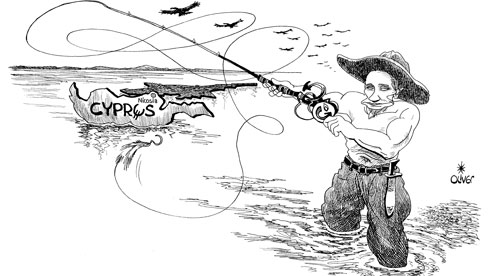In the tricky confrontation between Cyprus and the European Union, the Kremlin is just retaliating. The EU had nearly persuaded Cyprus to levy a confiscatory tax which would have hit Russian public companies. By now, a simple exit from the crisis – and a cheap one – has receded from view. And Russia’s lack of any sense of urgency in offering fresh aid to Cyprus puts convenient pressure on Europe.
Cyprus, meanwhile, has sent a man to Moscow hoping for help in exchange for some “advantages” for the Russian economy. Michalis Sarris, Cypriot Minister of Finance, declared [on March 20] that he had not come to Moscow empty-handed. If Russia pitched in, there were plenty of opportunities that would be opened up to the Kremlin, he explained, including a stake in the banking system and sharing in the exploiting of the gas fields south of the island. [[What Cyprus is requesting is absolutely not a loan]] – merely a business deal that could benefit both countries.
It would appear, however, that Russia wants to take its time. Andrey Kostin, Director of the VTB Bank [Vnechtorgbank], the main casualty of the Cypriot crisis, has announced that his bank has no interest in buying up the banking assets of the island: “There are two banks in critical straits there that need to be restructured. It would be absurd to claim that we have any interest in them. Our only interest is to regain, as quickly as possible, the ability to make payments and manage our customers’ accounts.” His bank, he added, will have to “stop its activities and make a clean and speedy exit from the Cypriot market” if there is any sign of “unlawful politically motivated decisions.”
EU’s ‘personal insult’ to Putin
The day before, Prime Minister Dmitry Medvedev stated in an interview to European media that the activities of major Russian banks and companies with State participation had been blocked in Cyprus, despite their having no accounting or tax problems. That, he explained, was what was behind the harsh statements coming from Moscow. Cyprus as a tax haven, he confirmed in passing, was an attraction not only for the Russian private sector, but for public companies as well. Russia would consider support to Cyprus, the Prime Minister added, once the EU has come out with its own basket of measures to deal with the crisis.
Russia is now stepping back, apparently unable to see a way to emerge from this crisis painlessly, and has decided to take revenge on the EU by adopting a wait and see position. If Moscow does withdraw, Europe will have to come up with not just €10bn to save Cyprus, but the full amount required or €17bn.
[[Faced with this geopolitical stand-off, some senior European officials have tried to tone down the rhetoric]]. José Manuel Barroso, the president of the Commission, referred to the late hour of the meeting of the EU Finance Ministers, which came to a decision Saturday at dawn, to explain why Moscow was not given notice in good time of the decision to impose the confiscatory tax.
While the tone coming from the EU is conciliatory, its actions are anything but. Starting Monday, the supply of cash to Cyprus by the ECB may be cut off, which will weaken the island’s economy. Yesterday, an anonymous European source threatened Cypriot banks with liquidation if no new agreement is reached on a tax on deposits. This has led (the New York Post to call the clash of wills between Russia and the EU an epic battle between German Chancellor Angela Merkel and President Putin, who, observers abroad believe, took the Eurogroup’s proposal to tax deposits as a personal insult.
Experts confirm that the island is in no condition to offer any truly beneficial proposal to Moscow. “For the Russian economy, the sole interest of Cyprus lay in its former usefulness as a financial platform beyond Russian legislation, but a reasonably solid and predictable one. From the point of view of an investor, Cyprus as a country is no better than any other politically stable state in the Eastern Mediterranean,” says Viktor Kuharski, Director-General of consulting group Development. He notes, however, that if Cypriot banks have reaped a fortune from Russia, they have gathered in even more from England. “The Germans have now decided to snatch a chunk of these secret deposits to put into the European treasury,” Mr Kuharski assumes. It was a move, though, that blew up in their faces.
Was this article useful? If so we are delighted!
It is freely available because we believe that the right to free and independent information is essential for democracy. But this right is not guaranteed forever, and independence comes at a cost. We need your support in order to continue publishing independent, multilingual news for all Europeans.
Discover our subscription offers and their exclusive benefits and become a member of our community now!












